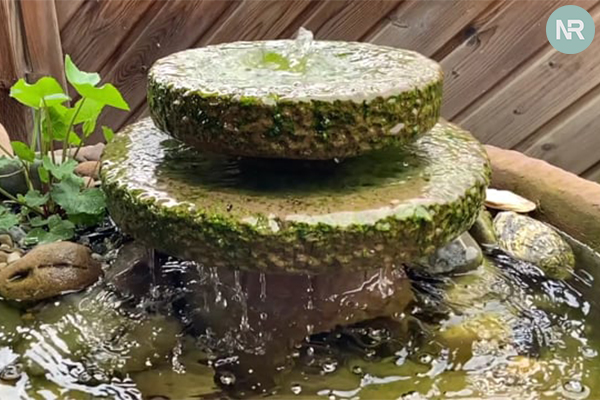Learn how to keep mosquitoes from laying eggs in outdoor fountains using effective prevention methods.
HOME >> Product Guide >> Water Fountain

If you want to hear the sweet sound of flowing water every day, an outdoor fountain outside the room is perfect. Just as indoor fountains enhance the house’s beauty, outdoor fountains enhance the beauty of the garden and yard. Also, the positive ions released from the water flowing from the fountain keep your outdoor environment free of pollution. How to keep mosquitoes from laying eggs in outdoor fountains. Here are seven ways to keep mosquitoes away from outdoor fountains.
But if you don’t clean the fountain regularly, it will harm the environment instead of polluting it. If the fountain is not cleaned for a long time, the water gets spoiled, giving birth to various harmful insects. Rotten water breeds the most harmful mosquitoes, which harm the environment and humans. Diseases like dengue and chikungunya spread from mosquito bites. So that mosquitoes can not lay eggs or larvae in your spring water, I will discuss all this in detail.
Just as moths prefer to live in the light, mosquitoes prefer to live in dirt or water. Ideal breeding grounds for mosquitoes are dirty water from outdoor fountains where eggs can lay. That is why they are so attracted to mosquito fountains. Mosquitoes are attracted to water fountains, birdhouses, and small fish ponds. For this reason, it is necessary to drain the wastewater from the fountain before the mosquitoes can breed and their eggs mature.
Various diseases such as malaria, zika virus, bay dengue, and chikungunya are caused by mosquitoes. Mosquito repellent is necessary to avoid itching and mosquito bites. Follow the steps below to keep mosquitoes away from your outdoor living space and outside your home.
Keep water fountains running regularly to discourage mosquito breeding. By doing this, the speed of the water flowing from the fountain will prevent the mosquitoes from laying their eggs. If you ever see mosquito eggs or larvae in the fountain water, increase the speed of the fountain pump, as this will destroy the mosquito eggs. When the motor is turned on, the water does not stay still, which prevents mosquitoes from sitting on top of the water, which plays a role in repelling mosquitoes and protecting against mosquito damage.
It takes a fountain all day to repel mosquitoes. At least 1 to 2 hours of running fountain water should be on your schedule daily. If you travel for a long time, the fountain will not be running, and the water in the fountain will stagnate. By doing this, the water will spoil, making it easy for mosquitoes to breed or for mosquito eggs to hatch. So mix some chemicals with water before going anywhere. Do not use pesticides that will harm the fountain. Mosquito Dunks work best for killing mosquitoes. Because it floats on top of the water and the fountain doesn’t do any damage.
Regular cleaning of outdoor fountains can keep mosquitoes at bay. Use fountain cleaner to drain the fountain. Using a cleaner in the fountain will remove the algae or larvae. You can also use vinegar. You can use vinegar and water spray to clean the inside and outside of your shower. Since vinegar is food-grade, it is very safe to use. If you notice that your fountain water pump is making more noise due to using vinegar, you should seek the help of a technician. Because vinegar sometimes freezes inside the motor.
If you want to repel mosquitoes in a water fountain in a way other than chemicals, you can plant mosquito repellent plants around the fountain. Preventive plants are not 100% guaranteed to work for large fountains. After that, planting trees will reduce the chances of mosquitoes near water fountains.
Marigolds work best to repel mosquitoes because the smell of these flowers works very well to repel mosquitoes. Place the trees near the fountain, as this will prevent mosquitoes from entering the fountain and enhance the beauty of the fountain. Moreover, you can plant plants like jasmine, mint, rose, and lavender.
The leaves of these plants can be powdered and used for water fountains if this is a natural way to keep insects away.
Use larvicide if mosquito infestation is high in your area. Larvicides are very effective in killing mosquito eggs. Using larvicide will protect your water fountain for several weeks.
Normal insecticides are not an option for your fountain. So it would help if you bought larvicides that are not highly toxic chemicals and acidic that are harmful to your fountain. Use natural larvicides for large outdoor fountains because birds come to bathe in large fountains. Special types of larvicides are also available for small backyard ponds. The application of larvicide does not damage the motor.
Read More: 10 Best Solar Powered Water Fountains
Cinnamon is not just a kitchen spice. Cinnamon has many benefits. Finely grind the cinnamon into your outdoor fountain but remember that if the powder is too large, it can get inside the motor and damage it. If you like, float the cinnamon bark in the sink. The extract from the cinnamon mixes with the fountain water to prevent mosquitoes from coming to the fountain.
To eliminate mosquitoes with cinnamon in the fountain, you must mix the amount of cinnamon. Add 5 grams of cinnamon per 1 gallon of water. Wait 24 hours after adding cinnamon to kill mosquito eggs and larvae in the fountain basin. If you want to destroy mosquito eggs immediately, increase the motor’s power after adding cinnamon. As a result, the eggs in the flowing water of the fountain will be destroyed.
One downside of mixing cinnamon in tap water is that it mixes with the water and turns it brown. Also, using it gives the smell of cinnamon to the nose from fountain water.
Use mosquito-repellent oil instead if you don’t want chemicals in your fountain. But if you want to use mosquito killer oil in a large fountain, how much oil will you use?
Using oil with water will prevent mosquitoes from sitting on the water, or even if they sit, mosquitoes will not be able to lay eggs or larvae in that area. And mosquitoes will not be able to come near the fountain if you use cinnamon, lavender, and citronella oil as oil. Oil should not be used in the fountain basin if the fountain contains fish. If you want to use oil in the fountain, keep the oil in the game so that it is beneficial and does not harm the insects.
The food source of mosquitoes is algae or algae, so more mosquitoes are born in algae. So keep outdoor fountains free of algae. Use distilled water in small fountains to keep algae free because distilled water does not spoil quickly and does not wear algae. Larger fountains use mineral water, so change the water every few days to keep algae free.
In addition to removing algae, you can keep your fountain attractive. When cleaning algae, follow all the rules and use an algaecide to keep your outdoor fountain algae-free for a long time. ecide to keep your outdoor fountain free of algae for a long time.

8 Benefits of Indoor Water Fountains
Read More »

How to Hang a Mirror with Rope on the Wall
Read More »

How to Properly Clean Your Jellyfish Lamp
Read More »